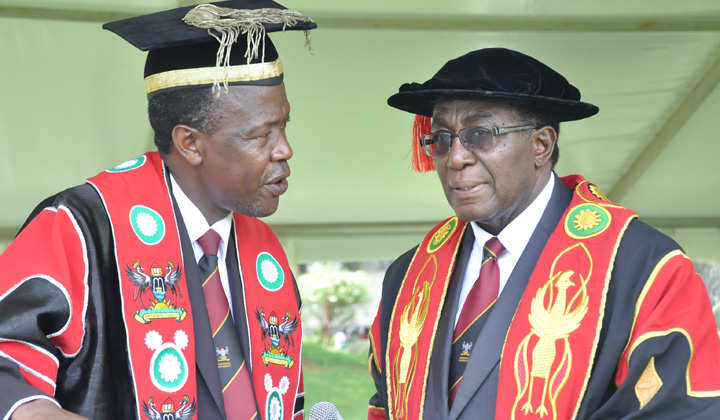“University education is a two way process. Lecturers provide information to guide you and on your part, there is a lot of initiative required using the available resources including the University Library, which is one of the best libraries on the African continent. It is a joint responsibility for students, staff and University Management to ensure that we maintain the reputation of Makerere University as a community of excellence that builds for generations,” said the Vice Chancellor, Prof. John Ddumba-Ssentamu at the Ceremony of Admissions held on 29th October 2015 in the Freedom Square.
As per the University tradition, the drums sounded as the Vice Chancellor’s procession comprising the Academic Registrar, Dean of Students, Director of Research and Graduate Training and College Principals fully in their academic regalia walked majestically from the Main Building to the Freedom Square.
Building on to the Orientation day held on 27th August 2015 where the Academic Registrar and other University officials shared with students information vital to their academic and social well being, the Admissions Ceremony held on 29th October 2015 provided an opportunity to the students to receive a special message from the Vice Chancellor.
Welcoming the Vice Chancellor’s procession, the students who had assembled in the Freedom Square stood up, waved to the University Management and College Principals, and used their smart phones to capture the memorable moments.
The Head of Department, Dr. Sylvia Nannyonga-Tamusuza together with the students of Performing Arts and Film led the Anthems. Leading the prayer, the Dean of Students, Mr. Cyriaco Kabagambe asked the Almighty God to bless the Admissions Ceremony for the Academic Year 2015/2016, the students and University leadership.
The Academic Registrar, Mr. Namoah-Masikye introduced the Vice Chancellor, Prof. John Ddumba-Ssentamu to the First Year students. “Dear students, you will recall that when I addressed you on the Orientation day held on 27th August 2015 here in the Freedom Square, I informed you that you will have a special day to receive a message from the Vice Chancellor. Today, 29th October 2015, I am pleased to introduce the Vice Chancellor who is presiding over the Admissions Ceremony,” he said amidst applause from the First Year students.
The following colleges/units presented students: College of Health Sciences; Makerere University Business School (MUBS); College of Agricultural and Environmental Sciences; College of Engineering, Design, Art and Technology; College of Natural Sciences; College of Veterinary Medicine, Animal Resources and Bio-Security; School of Law; College of Education and External Studies; College of Computing and Information Sciences; College of Humanities and Social Sciences; and the College of Business and Management Sciences.
As per the University procedure, the Academic Registrar called upon the respective College Principals/representatives to present the students to the Vice Chancellor. The students from the College/Unit being presented stood up and listened to the Academic Registrar reading a statement:
“Do you solemnly promise to seek the truth, to study diligently, to obey the Chancellor, Vice Chancellor, and those in authority, to observe the regulations of the University, to exercise discipline and to promote its good as far as in you lies.”
As expected, the First Year students from the respective Colleges/Units replied:
“ALL THIS I DO SOLEMNLY UNDERTAKE.”
Presenting the students to the Vice Chancellor, the College Principal or a Representative, read the statement: “Mr. Vice Chancellor, Sir, I present to you for admission to the University these new students of the College of …who have duly subscribed their names to the declaration they have made.”
Still standing, the students looked on with a lot of admiration as the Vice Chancellor (dressed in his academic regalia) faced them, smiled and nodded his head in an official way, confirming their admission into the University.
Enjoying the special moment, most of the students responded with laughter and would resume their seats full of energy and charisma.
Addressing the First Year students, the Vice Chancellor Prof. John Ddumba-Ssentamu congratulated the students on being admitted to various academic programmes of Makerere University. He emphasized to the students that they had responsibilities and obligations that are stipulated in their admission letters and the Makerere University Students Regulations 2015. In the same spirit, the Vice Chancellor encouraged the students to concentrate on their studies, be mindful of the choices they make, associate with the right people, and above all remain disciplined.
“Your success depends on your attitude and the choices you make now. I strongly urge you to use your time productively while you are here. Try to use your time here at Makerere University as a platform for achieving a better tomorrow. I urge you to make genuine friendships, those that will add value to your life. You need to make wise choices. As we strive to provide you the best services possible, you too need to take responsibility as students. Each one of us has a role to play,” said the Vice Chancellor.
At the climax of the Admissions Ceremony, all the students stood up, and listened to the proclamation from the Vice Chancellor:
“From today onwards, you are now students of Makerere University. You are formally admitted. I congratulate you and wish you a fruitful stay.”
Reiterating the Vice Chancellor’s message focusing on a bright and disciplined student, the Dean of Students Mr. Cyriaco Kabagambe appealed to the First Year students to read the Gazetted Makerere University Rules and Regulations 2015, which are binding.
As the Vice Chancellor’s procession prepared to leave the Freedom Square, the Senior Public Relations Officer Ms Ritah Namisango together with the students applauded the staff in Department of the Academic Registrar, the Ceremonies and Certificates Division and the respective College Registrars for organizing the Admissions Ceremony for the Academic Year 2015/2016.
Story by: Ritah Namisango, Mak Public Relations Office

 General3 days ago
General3 days ago
 General6 days ago
General6 days ago
 General1 week ago
General1 week ago
 General1 week ago
General1 week ago
 Natural Sciences2 weeks ago
Natural Sciences2 weeks ago



